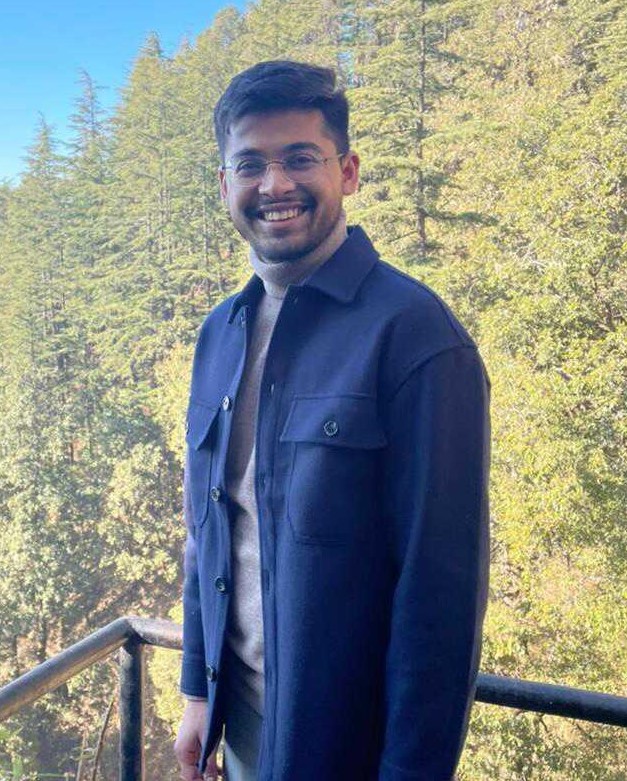IAS Officier
A dashing young IAS Officer from the Maharashtra Cadre, Mr Anmol Sagar is an inspiration to all young students. Right from his preparation days to LBSNAA days to what and how he is now, this splendid interaction with him covers it all!


By: Team catalyst
Having cracked the gruesome exam quite young this man has some powerful insights for all the students.
Views about our theme.
Talking about your theme, it's something I can talk a lot about. The nerd in me would wake up! In Geography, there is a concept about human adaptation. The concept called Possibilism was popularised by Vidal de la Blache who was a French geographer. The concept talks about how any creature adapts to changes in the environment. It isn't the environment dominating us, it's just human beings adapting to the environment.There can be numerous ways to look at your theme. We have become more hygienic, we have started washing hands frequently, covering our nose while sneezing, wearing a mask, etc. The greatest change that humans have adapted to during these times is avoiding crowds and learning to enjoy solitude.
How does it feel to finally achieve this milestone and how has it changed your life?
After joining the services you realize that clearing the exam is one of the easiest things in life even though it is the most difficult exam. This is because the job is 10 times harder than that, even though it does come with its benefits. You get to do the job that you have always dreamt of, the respect that you get is immense, you are open to infinite platforms. You get the attention of people. People want to get in touch with you and want to talk with you. You are interested in talking to me just because I hold this position. You deserve all of this for clearing such a tough and cruel examination. Everything feels overwhelming till you aren't on the field. Once you are there you realize that that was all a bubble and real life is very tough.
Being trained at LBSNAA Mussoorie is something all the test takers dream about. Is it a dream come true place?
Yes, LBSNAA is a dream-come-true-place. It's a dream destination for all the aspirants writing the examination for two reasons. Firstly, the location. The location is extremely beautiful as the academy is situated among the hills, and the campus is massive. You can see the clouds coming in, going out, snow-clad mountains all around you. There are freshly manicured gardens on the campus. From cutlery to the dresses to your tracksuits everything has an insignia of LBSNAA on it, which honestly, feels great. You get to dress up well, that teaches you how to be an officer. Camaraderie is something that you develop. Secondly, why I believe this place is very close to me is because of the kind of friendships you build there and the environment which you are in, I don't think you will find a safer place. You have cleared the exam, your career is fixed and your life is settled, and that kind of safe bubble you'll never get in your life. All your mistakes are forgiven. I cannot even dream of committing a mistake on the field because I know I will be reprimanded and that's not the case in LBSNAA.Being on the field I still miss the academy. I will be going back there in May for my phase 2 training and I'm excited about it. It's a very beautiful place and I don't want to give out much information about LBSNAA. I want all the aspirants studying for the exam to go there and experience that. That's all I can say and there are plenty of videos on YouTube where you can know more about that place.
Talking about your preparation and the lockdown imposed right now due to the pandemic, it might be a blessing for the more serious aspirants because one might say that the more focused people might have gotten more time to study but it also has taken a mental toll on most of us. What is your take on this?
I think for every serious candidate the preparation years themselves are kind of a lockdown. I was at my house for most of the time and I never went out partying; of course, short walks are a must! When you consider an aspirant’s lifestyle, you have to devote 12 to 13 hours of your day to studies, you are supposed to be like that, otherwise, you aren't preparing well! As for serious aspirants, I don't think the position of lockdown is too serious a deal, they are anyway used to that. That's my point of view. However, I get your point that it does take a toll. It must have been a tough time for all the aspirants but having said that, I still believe that for serious candidates it shouldn’t make much of a difference.
Since we are talking about the pandemic, how has your role as an officer changed after the onset of the pandemic and how did you handle these extra duties and the challenges that crept in due to the virus?
There is a culture in Maharashtra that the probationers are not given responsibilities early on, but I have been associated with a lot of things. I visited the Covid-19 centers in Aurangabad. I visited most of the hospitals and ICU wards in Aurangabad, just to get exposure. I saw the control room of Aurangabad maintained by the Municipal Corporation. When I was the chief officer at Kannad, I took care of the Covid situation myself, making sure everyone was getting food on time and bed sheets were getting cleaned. Having said that, it was not a humongous task for me as compared to that of district collectors and other officers on the field. I had a very partial role to play. It was great exposure for me. Having to deal with the disaster so early on in my career is not an opportunity that all young officers get.
Like you have said that the District Collectors had a prominent role to play in the pandemic. What is a general workday for a DM or a Collector, most of the aspirants don't know exactly what goes on in the field, as there are a lot of myths surrounding what the powers are, what the jurisdiction is, what role they have to play in the society? Could you shed some light on that?
District Magistrate is kind of a misnomer because the powers of a magistrate in Maharashtra are not so much, and the role of DM varies from state to state. The most important work of the Collector is land revenue. If a road is supposed to be built or any industry is to be set up, or for anything at all, you require land and that cannot be sanctioned without the Collector’s signature. Furthermore, the collector is responsible for more than 100 committees in the district, from taking care of the army veterans to agriculture to skill development to many more things. The working schedule of a Collector is quite busy.When it comes to epidemics or disaster management, (like right now during a pandemic) the Collector is responsible for everything, as per the Disaster Management Act. During such situations, be it floods, earthquakes, cloudbursts, or riots for that matter, the Collector is solely responsible. This is broadly what falls under the Collector. Even though some of the things do not fall under him directly, he is the head. If he says something, that needs to be done. The prestige that is attached to a District Collector is very high because he is responsible for basically everything in the district, at least for the Maharashtra Cadre. If you go back to U.P or Bihar the power vested with the Collector is much more than that in Maharashtra. He is like a godly figure there. He is like the whole and soul of the district. What CM is to the state, DM is to the district.
As an aspirant, one usually has something that they would like to work on after they join the services, what is that something for you?
There are ideals that are very important for aspirants and young officers like me. I want to work in the field of education and health. Right now I have not gotten the opportunity single-handedly, but yes, I really want to work in these fields at a very grass-root level, village level, the Taluka level. That is a very broad field, but if I were to talk more specifically, I would want to work in the primary health care system and primary education, for that is something that we lack. Had our primary health care system been better, tackling Covid could have been much easier. That is something we need to work on and that is what I also believe in.
Did you have something else in mind like “ye nahi hua toh ye karunga”, like any backup plans?
Actually, I am a graduate of geography. There is no other government opportunity except getting into academics so there was no backup plan. It’s both good and bad. For me it was good because it gave me the intensity. It does not work well for everyone, some people require backup. That's why they take engineering and don't go for Humanities. That was never the case with me. I had always taken arts and I always loved the subjects in humanities and I could have never performed well otherwise. So yeah, no backup!
Is there any message you'd like to share with our aspirants?
Yes. One really important thing if you are preparing for the services you must have a very solid and very individualistic reason for your preparation. Don't come into services because you have seen two people preparing for it or your father or mother have said to prepare because many people are doing so and then they suffer in the end. So please don't do that. Find your reason and then prepare. Don’t worry about success or failure, for that is beyond your control.
Credits
Team CATALYST
Interviews have a way of making others' experiences feel like our own. These interviews are brought to you by Team Catalyst!